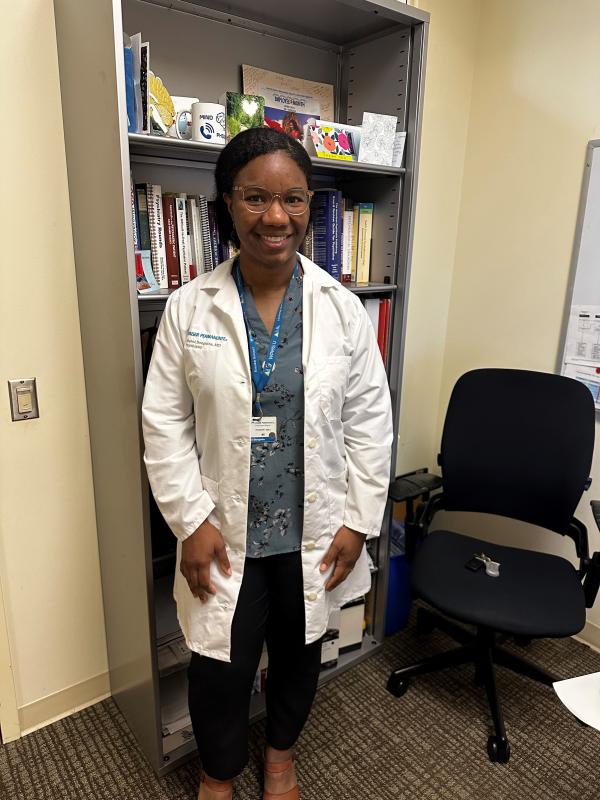Using my MD for Mental Health Advocacy
Published 02/12/2025 in Alumni Features
Written
by Mabel Bongmba |
02/12/2025

Prior to med school, I dedicated two years to health promotion and education in underserved communities. I worked with a non-profit to support outreach and harm reduction efforts targeting women living with HIV, grant writing and co-leading maternal health classes at a public health clinic, and volunteered as a health assistant in rural Belize. This was a welcomed change of pace after spending countless hours in laboratories as a student at UC Berkeley!
Initially, I set out to become a family practice physician, which led me to attend medical school at the University of California, San Francisco. However, my experiences revealed the pervasive stigma surrounding mental health. I consistently witnessed its effect on my patients across various medical specialties. This insight compelled me to pivot my career focus. My clinical elective with a culturally-focused intensive case management team serving people living with severe mental illness and other social challenges solidified my commitment to psychiatry. I have been a general psychiatrist for over a decade; I started practicing medicine under my own license 15 years ago as a resident at San Mateo County’s training program.
I relocated to the Seattle area right out of residency. I spent a year consulting with medically ill hospitalized patients and providing care for psychiatric patients with severe mood disorders, psychosis, and alcohol and drug withdrawal. I have spent the majority of my career (11 years) with an HMO that was eventually acquired by Kaiser Permanente. In addition to my adult psychiatry practice, I have held clinic, department, and regional leadership positions. I have really valued my work supporting equity and inclusion at Kaiser Permanente Washington (pre- and post-pandemic) and primary care behavioral health integration.
I was appointed to the Washington Medical Commission by the governor in 2022. The Washington Medical Commission promotes patient safety through the regulation of the practice of medicine. My time with the commission allowed me to apply my clinical experiences across myriad care delivery systems in a unique and meaningful way. It was an honor to be selected, but I unfortunately had to resign after one year — it was nearly impossible to fulfill my responsibilities with my commission alongside school, work, and family obligations.
Over the past couple of years, I completed the University of Washington Department of Psychiatry’s Integrated Care Training Program while implementing the launch and spread of full behavioral health integration in our primary care clinics. Evidence-based approaches to mental health integration such as the Collaborative Care Model help to reduce stigma around psychiatric treatment while significantly improving much needed access to this care. This year I have shifted my career to focus on consultation and medical leadership exclusively. In this new phase in my career, I support primary care providers caring for patients in the rural Northeast, as well as psychiatric providers caring for geriatric medically in patients California and psychiatrically complex patients in under resourced Pierce County, WA.
It’s a privilege to be entrusted with another human’s health and wellbeing. Effective mental health treatment saves lives. Not all patients will experience significant improvement or avoid complications, but, fortunately, many do. My most gratifying moments in my career have involved direct patient care, enhancing the quality of care delivery at a systems-level by improving health equity, mentoring aspiring health professionals, and supporting colleagues through career challenges.
I would encourage Scholars pursuing a career in medicine to reach out to Evelyn or connect directly with other Scholars for mentorship, guidance, and support. I’m reminded of an African proverb: If you want to go fast, go alone; but if you want to go far, go together. Curiosity and compassion will serve you well in any health career and especially as a mental health professional; if these are lacking, take the time to make adjustments to mitigate and address burn out. It’s okay when things don’t work out as planned — unexpected challenges lead to growth. Lastly, always advocate for yourself and those you serve — the power of your voice can lead to transformative change.

